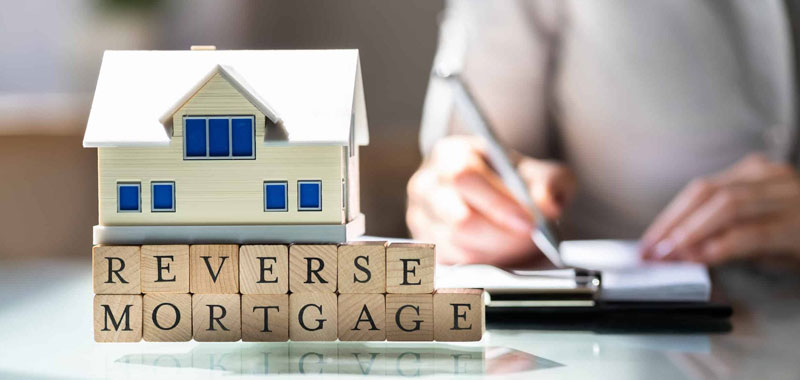Is It the Right Time to Purchase Reverse Mortgage? Here’s What to Consider
Is It the Right Time to Purchase Reverse Mortgage? Here’s What to Consider
Blog Article
Unlock Financial Liberty: Your Guide to Purchasing a Reverse Mortgage
Comprehending the complexities of reverse home loans is essential for house owners aged 62 and older seeking economic freedom. As you consider this option, it is crucial to understand not just how it functions however also the implications it may have on your financial future.
What Is a Reverse Mortgage?

The fundamental allure of a reverse mortgage hinges on its possible to enhance monetary flexibility during retired life. House owners can make use of the funds for different objectives, including medical expenditures, home enhancements, or daily living costs, thus providing a safeguard during a critical point of life.
It is important to comprehend that while a reverse mortgage permits increased cash flow, it additionally lowers the equity in the home gradually. As rate of interest gathers on the impressive lending balance, it is important for prospective borrowers to thoroughly consider their long-term economic plans. Consulting with a financial consultant or a reverse home mortgage professional can give important insights into whether this alternative straightens with an individual's monetary goals and scenarios.
Qualification Needs
Recognizing the eligibility needs for a reverse mortgage is vital for property owners considering this economic alternative. To qualify, candidates should be at the very least 62 years old, as this age requirement permits seniors to accessibility home equity without month-to-month mortgage repayments. Additionally, the homeowner should inhabit the home as their main residence, which can include single-family homes, specific condominiums, and made homes meeting specific guidelines.
Equity in the home is one more vital demand; property owners normally require to have a significant quantity of equity, which can be established with an evaluation. The amount of equity offered will directly affect the reverse home loan quantity. Applicants should show the capability to preserve the home, consisting of covering property taxes, property owners insurance, and maintenance costs, guaranteeing the property remains in excellent problem.
Furthermore, possible consumers have to go through a financial analysis to examine their income, credit rating, and overall monetary circumstance. This analysis aids lenders identify the applicant's capability to satisfy recurring responsibilities connected to the home. Satisfying these demands is crucial for safeguarding a reverse home loan and ensuring a smooth economic transition.
Benefits of Reverse Home Mortgages
Numerous advantages make reverse mortgages an enticing option for seniors wanting to enhance their financial adaptability. purchase reverse mortgage. One of the key benefits is the ability to transform home equity right into money without the need for month-to-month home mortgage payments. This function enables seniors to accessibility funds for different demands, such as medical costs, home improvements, or daily living costs, therefore reducing economic stress and anxiety
In addition, reverse mortgages give a safety and security internet; seniors can remain to stay in their homes for as lengthy as they meet the car loan requirements, cultivating stability during retirement. The earnings from a reverse home loan can also be used to delay Social Security advantages, potentially causing higher payments later on.
Furthermore, reverse home loans are non-recourse lendings, indicating that customers will certainly never owe greater than the home's worth at the time of sale, shielding them and their successors from economic responsibility. The funds obtained from a reverse mortgage are typically tax-free, adding an additional layer of economic alleviation. In general, these benefits position reverse mortgages as a functional solution for seniors seeking to improve their financial circumstance while keeping Click This Link their valued home setting.

Costs and Fees Involved
When thinking about a reverse home mortgage, it's important to understand the numerous prices and fees that can impact the overall financial photo. Recognizing these expenses is important for making an educated choice concerning whether this financial product is right for you.
One of the main costs connected with a reverse home mortgage is the source cost, which can vary by lending institution yet normally ranges from 0.5% to 2% of the home's assessed worth. Furthermore, homeowners should anticipate closing prices, which might consist of title insurance coverage, assessment fees, and credit score record costs, typically totaling up to a number of thousand dollars.
An additional significant cost is home loan insurance coverage costs (MIP), which safeguard the lending institution versus losses. This charge is normally 2% of the home's value at closing, with a continuous yearly premium of 0.5% of the continuing to be lending equilibrium.
Last but not least, it is very important to take into consideration recurring expenses, such as building tax obligations, property owner's insurance, and upkeep, as the consumer stays in charge of these expenses. By carefully reviewing these prices and charges, property owners can much better examine the financial effects of going after a reverse mortgage.
Actions to Get Begun
Getting going with a reverse mortgage includes several crucial actions that can help enhance the process and ensure you make educated decisions. First, analyze your economic situation and figure out if a reverse mortgage lines up with your lasting goals. This includes reviewing your home equity, current debts, and the requirement for added income.
Next, research study different lending institutions and their offerings. Look for credible establishments with positive reviews, transparent charge structures, and affordable rate of interest. It's vital to compare problems and terms to discover the ideal suitable for your demands.
After picking a lending institution, you'll require to finish a detailed application process, which generally requires documentation of income, assets, and residential or commercial property details. Take part in a counseling session with a HUD-approved counselor, that will certainly give understandings right into the effects and duties of a reverse home loan.
Final Thought
In conclusion, reverse home mortgages provide a viable alternative for seniors looking for to anchor improve their economic stability throughout retired life. By transforming home equity into obtainable funds, house owners aged 62 and older can address different financial demands without the pressure of regular monthly repayments.
Recognizing the intricacies of reverse home mortgages is important for home owners aged 62 and older seeking economic freedom.A reverse home mortgage is a financial product made mainly for home owners aged 62 and older, allowing them to get more transform a section of their home equity into money - purchase reverse mortgage. Consulting with an economic advisor or a reverse home loan professional can provide useful understandings right into whether this option lines up with a person's economic goals and situations
Additionally, reverse home mortgages are non-recourse car loans, meaning that borrowers will never owe more than the home's value at the time of sale, shielding them and their beneficiaries from economic responsibility. In general, these advantages placement reverse mortgages as a functional remedy for seniors looking for to improve their economic scenario while maintaining their treasured home setting.
Report this page